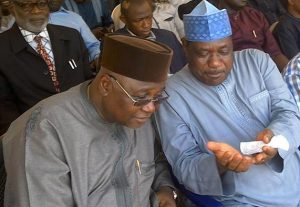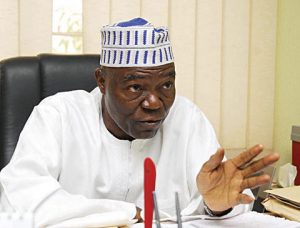Nigeria is in the grip of party primaries as the ruling party and the dominant opposition party are both select candidates for the upper chamber of the national legislature, the powerful governorship position at the helm of each of the 36 states and the presidency. The outcomes in some of the states have unsettled established order while there have been beautiful compromises in some others.

Now, a confirmed presidential candidate of the ruling APC
At the level of the presidential candidates, only the ruling All Progressives Congress, (APC) has sorted itself. They have held their presidential primaries and the incumbent has been endorsed as the one and only one. The main opposition party, the People’s Democratic Party, (PDP) is scheduled to hold its presidential primaries from October 6-7th, 2018. Some of the thirteen aspirants slugging it out are Atiku Abubakar; Ibrahim Dankwambo, Aminu Tambuwal, David Mark; David Jang, Attahiru Bafarawa, Sule Lamido, Bukola Saraki, Kabiru Tanimu, Rabiu Musa Kwankwaso, Ahmed Mohammed Makarfi.
All these are from the northern part of the country in tandem with the principle of rotation of power guiding elite pact thereto. Unless someone else other than the incumbent is elected in February 2019, power is scheduled to rotate to the southern part in 2023.
The key issue in the election of a flag bearer of the PDP is that candidate who is adequate in himself to unite the badly fragmented ruling class, beat the incumbent, be able to run a disciplined and efficient government, pay very serious attention to a deliberate programme of nationalist management of the economy and review the theory and practice of Nigerian foreign policy in relation to the contradictions of globality. Who can do this among the above list? Very, very few can. But democracy welcomes all to contest. So, only the ballot would decide but without implying that the godfathers factor, money, message and networking won’t be at work. All in all, all eyes are on three out of the above list: two from the Northeast and one from the Northwest.
Whatever happens, it is on the outcome of the PDP Convention that will fire or kill the Nigerian idea. Should the convention produce a sober candidate capable of firing popular imagination, then 2019 may become more exciting as the two dominant parties struggle to out flank the other. If the PDP produces a dull, uninspiring candidate as it has done before, then the incumbent president may totally relapse into monotonous anti-corruption propaganda, sure that it doesn’t even have to task its brain.
But the above sketch is that of the Federal level. The outcomes from the states are no less interesting. It has been mixed outcomes from Benue, Borno, Plateau and Kano, the focus of the rest of this report for the reason that they are either already zones of conflict or potentially explosive.

Now, the confirmed gubernatorial candidate of the PDP for Benue State
Governor Samuel Ortom of Benue State has won the primaries for the PDP to contest for the seat in 2019. He beat two others, Mr. John Tondo and Dr Paul Orhii to emerge the flag bearer. The margin between him and the two others is so wide. It came as follows: Ortom: 2243; Tondo: 450 and Orhii: 10.
Ortom’s reclamation of power in the PDP shows the fluidity of the political processes in Nigeria. The PDP is the party he left in 2015 because he could not get the governorship. Having got the ticket, he is now set for the battle for second term. What is left is getting a deputy-governor because, for whatever reasons, Mr Engineer Benson Abounu, the current deputy, does not appear set to get it back. Party leaders have, according to well connected sources, already given a specific name to Ortom as a condition for re-admitting him into the PDP. To win, he must oblige the party by dumping the incumbent.
When Intervention sought to know why the name being speculated might accept to become deputy-governor when he is already occupying a more powerful position, it was understood that the position of deputy-governor has more symbolic and actual leverage than the position the person already occupies. The number of jeeps in the deputy-governor’s convoy, the leverage over appointments and even the protocol regard of being acknowledgment at every occasion he attends are considered strategic.
The battle line for the governorship in Benue State is, however, not drawn yet because the APC was yet to start its own primaries by 3. 00 pm today. They are still trying to resolve what appears to be a tussle between Abuja and Makurdi over who should be endorsed. While Abuja prefers Barrister Emmanuel Jime, a former member of the House of Representatives and a political appointee in the Buhari regime, Makurdi is understood to bid for Barrister Benjamin Adanyi, a member of the Benue State House of Assembly. While Adanyi has the legacy of being one of the eight legislators who did not defect with Ortom to the PDP, Emmanuel Jime is seen as being capable of independent mindedness. In addition to the elementary populism he has got, that could make him to be feared.

Some of the APC leaders in Benue State
While the party elders are going over the issue, delegates are seen strolling around aimlessly waiting to be called. A specialist in Benue politics that Intervention spoke with suggests that unless a party elder such as Senator George Akume is pacified, Barrister Adanyi would emerge the winner. Akume, it is said, is the one who knows the delegates and whose bidding they would do. What the suspense means is that there might be no results from the APC end till about midnight.
Benue is currently a conflict torn state in Nigeria and, like Borno, Plateau, Zamfara and one or two more such state, who becomes the governor in such states ought to be a national security issue. It is not clear if that is why Abuja is insisting on Emmanuel Jime for governorship but Abuja is an interested party in the Benue crisis and Jime’s victory may not be understood across the board as something dictated by national security considerations warranting the defeat of Ortom is defeated by Jime.
National security as a defining factor in leadership recruitment appears to have decided the victory of General Jeremiah Useni as the governorship candidate of the PDP in Plateau State, another hub of violence in the past one decade. But, in this case, it was a consensus worked out by players internal to the PDP and the state who just want someone with knowledge and access to the heart of the security establishment. It is based on the party’s assessment that the government in the past few years has been helpless and hopeless as far as the security situation is concerned and the way forward is a leadership team that could, in the words of an insider, “recover the name, the territory and the dignity of Plateau State”.

Gen Useni
Following the strategic assessment, contenders against the candidature of General Jeremiah Useni withdrew from the race to see the elderly General and former Minister of the Federal Capital Territory emerge as the governorship candidate of the PDP. The PDP is the opposition party in the state now. It is calculating on beating the incumbent APC government in the state “unless something goes fundamentally wrong in the election or in the run-up to it”
The message from Plateau seems to be the message of the search for a stabiliser who would assemble the very best of Plateau and re-establish the peace that used to be the soul of personality of the state. What is, however, the message from Borno, another cauldron in Nigeria’s contemporary security politics? In particular, why did the state governor, Kashim Shettima write so long a letter? And what is unfolding in Kano where it has been tense between to landlords- former governor, Rabiu Musa Kwankwaso and the incumbent, Dr Abdullahi Ganduje? And then a peep into Kaduna, Yobe, Imo, Lagos and Oyo. All these in the second part of this report shortly!




























